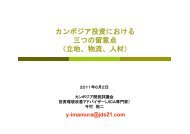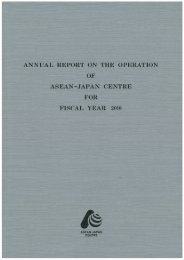2 Alcoholic Beverages (Beer, Wine, Whisky, etc.) - ASEAN-Japan ...
2 Alcoholic Beverages (Beer, Wine, Whisky, etc.) - ASEAN-Japan ...
2 Alcoholic Beverages (Beer, Wine, Whisky, etc.) - ASEAN-Japan ...
You also want an ePaper? Increase the reach of your titles
YUMPU automatically turns print PDFs into web optimized ePapers that Google loves.
C-2. <strong>Alcoholic</strong> <strong>Beverages</strong> (<strong>Beer</strong>, wine, whisky, <strong>etc</strong>.)<br />
The taxable volume is regarded as equivalent to the volume of liquors distributed and sold in <strong>Japan</strong>. Liquor taxes are collected<br />
on domestic liquor when it is shipped from the factory, and on imported liquor when it is taken from the bonded warehouse.<br />
happoshu uses less malt than beer, they are classified as miscellaneous liquors under the Liquor Tax Law, and thus are subject<br />
to lower liquor taxes than beer.<br />
3. Key Considerations with regard to exports to <strong>Japan</strong><br />
(1) Regulations and Procedural Requirements at the time of Importing in <strong>Japan</strong><br />
<strong>Alcoholic</strong> beverage imports are subject to the provisions of the Food Sanitation Law and the Liquor Tax<br />
Law.<br />
1) Food Sanitation Law<br />
All food products to be imported for the purpose of sales and marketing are subject to the procedures of<br />
Food Sanitation Law. The Importers must submit a “Notification Form for Importation of Food, <strong>etc</strong>.” together<br />
with other necessary documents as ingredients list and production process chart when the processed food is<br />
the case, to the quarantine station at the port of entry. Upon examination of the documents, when the products<br />
are judged as subject to sanitary inspection, the inspection will be carried out inside bonded area and then<br />
decision will be made for import. The procedures required under the Food Sanitation Law is shown below.<br />
Marketing Guide for <strong>ASEAN</strong> Exporters to <strong>Japan</strong><br />
200<br />
Fig. 13 Procedures required under the Food Sanitation Law<br />
Advance consultation service<br />
Advance information acquisition (regarding production methods, content of ingredients, <strong>etc</strong>.)<br />
Advance inspection (by the competent government agency of the exporting country,<br />
or the official laboratory registered with the Minister of Health, Labor and Welfare)<br />
Submission to the Quarantine Station<br />
(“Notification Form for Importation of Foods, <strong>etc</strong>.” and other related documents)<br />
Examination of documents<br />
Cargo required inspection Cargo not required inspection<br />
Failure Pass<br />
Reshipment, destruction,<br />
conversion to other purposes<br />
Certificate of notification processing, or<br />
certificate of passing inspection<br />
Customs declaration<br />
On May 29, 2006, the new positive list system was introduced and came into force. The system stipulates<br />
all food products, if detected agricultural pesticides, feed additives, animal veterinary drugs to remain in<br />
excess of certain quantity, importation and sales of such food products will be in principle prohibited. In this<br />
system, for the agricultural pesticides <strong>etc</strong>. recognized to use and remain in the product, the maximum residual<br />
level is fixed, and for other chemicals uniform standard of 0.01ppm residual level is applicable (quantity<br />
understood as hardly affect human health).<br />
All food products, including processed food products, are subject to the positive list system, and of course<br />
alcoholic beverages are also subject to the system. For more detail, refer to the Ministry of Health, Labor,<br />
and Welfare website. (⇒http://www.mhlw.go.jp/english/topics/foodsafety/positivelist060228/index.html)<br />
It is required for the importers to gather abundant and enough information on the projected import foods to<br />
study whether the products meets the requirement of the Food Sanitation Law in their specifications and<br />
standards by obtaining, in advance, ingredients lists and production process charts or by making consultation<br />
with the quarantine office.<br />
Prior to importing, the importer may take a sample of forthcoming imports to laboratories registered with<br />
the Ministry of Health, Labor and Welfare or the competent governmental agencies of the exporting countries.<br />
Those test results may be substituted for the corresponding inspection at the port of entry, which expedites the<br />
quarantine process.<br />
In addition, importers who wish to submit their notification by computer may make use of the computerized<br />
FAINS (Food Automated Import Notification and Inspection Network System) for processing import-related




